|
|
|
Sort Order |
|
|
|
Items / Page
|
|
|
|
|
|
|
| Srl | Item |
| 1 |
ID:
138341
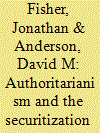

|
|
|
|
|
| Summary/Abstract |
Debate on the ‘securitization’ of aid and international development since 9/11 has been anchored in two key claims: that the phenomenon has been driven and imposed by western governments and that this is wholly unwelcome and deleterious for those in Africa and elsewhere in the developing world. This article challenges both of these assumptions by demonstrating how a range of African regimes have not only benefited from this dispensation but have also actively encouraged and shaped it, even incorporating it into their own militarized state-building projects. Drawing on the cases of Chad, Ethiopia, Uganda and Rwanda—four semi-authoritarian polities which have been sustained by the securitization trend—we argue that these developments have not been an accidental by-product of the global ‘war on terror’. Instead, we contend, they have been the result of a deliberate set of choices and policy decisions by these African governments as part of a broader ‘illiberal state-building’ agenda. In delineating this argument we outline four major strategies employed by these regimes in this regard: ‘playing the proxy’; simultaneous ‘socialization’ of development policy and ‘privatization’ of security affairs; making donors complicit in de facto regional security arrangements; and constructing regime ‘enemies’ as broader, international threats.
|
|
|
|
|
|
|
|
|
|
|
|
|
|
|
|
| 2 |
ID:
138335


|
|
|
|
|
| Summary/Abstract |
This article considers the importance of Al-Qaeda and Pakistan in driving British Islamic extremist terrorism during the past decade. Between 2003 and 2013, almost 50 British-born Muslims engaged in multiple high-profile terrorism conspiracies. All were designed to kill or seriously injure British citizens. Drawing on recently obtained court transcripts which offer remarkable detail, these plots are analysed from the point of view of radicalization, finance, training and operational direction. The emergence of extremist terrorism in the UK has its genesis within the Islamic fundamentalist movement, a socio-political ideology that arrived in London in the early 1990s. Contrary to the prevailing discourse, members of the movement constitute a far from homogenous set of individuals. Based on age, overseas connections, experience of conflict and religiosity, they each fulfill diverse tasks that range from preaching and fundraising to facilitating combative jihad. A minority adopted an extremist position that led them to carry out acts of terrorism. Since 2006, the role of Al-Qaeda and Pakistan in relation to this process has steadily declined. For the past seven years British Islamic extremists have pursued terrorism in whatever way they can on their own, with little or any direct support or influence from overseas. The security agencies are now asking how far current events in Syria will overturn this state of affairs.
|
|
|
|
|
|
|
|
|
|
|
|
|
|
|
|
| 3 |
ID:
138340
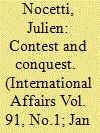

|
|
|
|
|
| Summary/Abstract |
For more than a decade, Russia's foreign policy has sought to challenge the international consensus on a number of issues. Today, as the international internet ecosystem is becoming more volatile, Moscow is eager to shift the western narrative over the current global internet governance regime, in which the United States retains considerable leverage. In a context wherein states increasingly forge links between cyberspace and foreign policy, this article explores Russia's deepening involvement in internet governance. The disclosure by Edward Snowden of the US government's wide net of online surveillance contributed to legitimize the Russian approach to controlling online activity. While the struggle around the narrative of internet governance has been heating up since then, Russia actively seeks to coordinate internet governance and cyber security policies with like-minded states in both regional forums and the United Nations. By introducing security concerns and advocating more hierarchy and a greater role for governments, Moscow is contributing to the politicization of global cyber issues and seeking to reshape the network in accordance with its own domestic political interests. Indeed, the Russian leadership has come to consider the foreign policy of the internet as the establishment of a new US-led hegemonic framework that Washington would use to subvert other sovereign states with its own world views and values.
|
|
|
|
|
|
|
|
|
|
|
|
|
|
|
|
| 4 |
ID:
138342
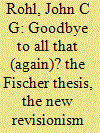

|
|
|
|
|
| Summary/Abstract |
What is the truth about the nature of the First World War and why have historians been unable to agree on its origins? The interpretation that no one country was to blame prevailed until the 1960s when a bitter international controversy, sparked by the work of the Hamburg historian Fritz Fischer, arrived at the consensus that the Great War had been a ‘bid for world power’ by imperial Germany and therefore a conflict in which Britain had necessarily and justly engaged. But in this centennial year Fischer's conclusions have in turn been challenged by historians claiming that Europe's leaders all ‘sleepwalked’ into the catastrophe. This article, the text of the Martin Wight Memorial Lecture held at the University of Sussex in November 2014, explores the archival discoveries which underpinned the Fischer thesis of the 1960s and subsequent research, and asks with what justification such evidence is now being set aside by the new revisionism.
|
|
|
|
|
|
|
|
|
|
|
|
|
|
|
|
| 5 |
ID:
138337
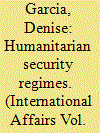

|
|
|
|
|
| Summary/Abstract |
This article introduces a novel concept, humanitarian security regimes, and enquires under what conditions they arise and what is distinctive about them. Humanitarian security regimes are driven by altruistic imperatives aiming to prohibit and restrict behaviour, impede lethal technology or ban categories of weapons through disarmament treaties; they embrace humanitarian perspectives that seek to prevent civilian casualties, precluding harmful behavior, protecting and ensuring the rights of victims and survivors of armed violence. The article explores how these regimes appear in the security area, usually in opposition to the aspirations of the most powerful states. The existing regimes literature has mostly taken a functional approach to analyzing cooperation, lacks a humanitarian hypothesis and does not explore the emergence of new regimes in the core area of security. The author argues that in the processes of humanitarian security regime-making, it is the national interest that is restructured to incorporate new normative understandings that then become part of the new national security aspirations. This article intends to fill this gap and its importance rests on three reasons. First, security areas that were previously considered to be the exclusive domain of states have now been the focus of change by actors beyond the state. Second, states have embraced changes to domains close to their national security (e.g. arms) mostly cognizant of humanitarian concerns. Third, states are compelled to re-evaluate their national interests motivated by a clear humanitarian impetus. Three conditions for the emergence of humanitarian security regimes are explained: marginalization and delegitimization; multilevel agency, and reputational concerns.
|
|
|
|
|
|
|
|
|
|
|
|
|
|
|
|
| 6 |
ID:
138334


|
|
|
|
|
| Summary/Abstract |
This article assesses Iran's strategy in dealing with the threat of the Islamic State in Iraq and Syria (ISIS). It examines the implications of the rise of ISIS in Iran's immediate neighbourhood for Tehran's policies in Syria and Iraq and investigates how each of these countries affects Iranian national interests. It provides an overview of the major events marking Iran and Iraq's relations in the past few decades and discusses the strategic importance of Iraq for Iran, by looking at the two countries' energy, economic and religious ties. It also considers Iran's involvement in Syria since the beginning of the Syrian conflict. The article sheds light on the unilateral action taken by Tehran to counter ISIS, the adjustments it may have to make to its involvement in Syria, and the potential areas for tactical cooperation between Iran and the United States, as well as other key regional states such as Saudi Arabia. The article investigates three likely scenarios affecting the developments in Iraq and Iran's possible response to them as the events in the Middle East unfold.
|
|
|
|
|
|
|
|
|
|
|
|
|
|
|
|
| 7 |
ID:
138336


|
|
|
|
|
| Summary/Abstract |
The establishment of the Responsibility to Protect (R2P) process and the International Criminal Court (ICC) were seen by many to constitute significant progress in the protection of human rights. However, these institutions are now in crisis, due in large part to their failure to prevent or prosecute recent acute human rights abuses in Syria. There have been two responses to this crisis: the first assumes that the crisis is caused by the current structures of international governance, in particular the power of the United Nations Security Council (UNSC), and calls for radical reform. The second sees possibilities within the current structure and advocates making R2P and the ICC more closely aligned under UNSC control. The article argues that both responses are mistaken and sets out an argument in favour of refocusing on the complementary nature of each institution. The Court's most successful actions have been in exercising the powers afforded by its complementary jurisdiction in situations such as Colombia. Similarly, R2P works more successfully at preventing conflict and changing expectations of acceptable state behaviour than it does at confronting situations in which large-scale violence has begun. The article argues that the ICC and R2P should focus on ‘positive complementarity’ agendas, with the ICC devoting more resources to assisting states to build legal capacity in order to deter future conflict through stronger domestic criminal systems, and advocates of R2P focusing less on intervention in live conflict situations and more on building within states the capacity and resources to protect their own populations.
|
|
|
|
|
|
|
|
|
|
|
|
|
|
|
|
| 8 |
ID:
138343
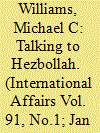

|
|
|
|
|
| Summary/Abstract |
The two studies under review, by Matthew Levitt and Lina Khatib et al., present very different pictures of Hezbollah, pictures which are not necessarily conflicting and are indeed, in many ways, complementary. Levitt focuses on the group's long record of terrorism dating back more than 30 years to the early 1980s and its violent attacks on US marines and French forces then based in Lebanon. Over that period, of course, as Lina Khatib and her co-authors demonstrate, Hezbollah has grown in stature as a political party. Khatib and her colleagues portray a party that has deliberately sought to keep Lebanon a weak and divided country, despite the efforts of the West and Gulf Arab states to strengthen the Lebanese state. These two studies add immensely to our knowledge of Hezbollah and its extraordinary rise over the past three decades to become one of the major political and military actors in the Middle East.
|
|
|
|
|
|
|
|
|
|
|
|
|
|
|
|
| 9 |
ID:
138338


|
|
|
|
|
| Summary/Abstract |
The idea of holding an in/out referendum on Britain's membership of the European Union has increasingly become a norm of British politics, an act seen as a necessary step for the country to answer what David Cameron described as the ‘European question in British politics’. A referendum, it is hoped, will cleanse British politics of a poisonous debate about Europe and democratically sanction a new stable UK–EU relationship, whether the UK stays in or leaves. Such hopes expect more of a referendum than it can provide. The European question is a multifaceted one and whatever the result of a referendum it is unlikely to address underlying questions that will continue to cause problems for UK–EU relations and Britain's European debate. A referendum can be a step forward in better managing the relationship and debate, but it is only that: a single step, after which further steps will be needed. Coming to terms with the European question and bringing stability to Britain's relations with the EU—whether in or outside the EU—will require comprehensive, longer-term changes which a referendum can help trigger but in no way guarantee.
|
|
|
|
|
|
|
|
|
|
|
|
|
|
|
|
| 10 |
ID:
138339
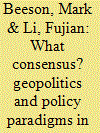

|
|
|
|
|
| Summary/Abstract |
The Washington Consensus is not what it was. A model of development associated with the Untied States, it has been diminished both by apparent failures, widespread criticism and by the recent economic crisis that had its origins in the US. Anglo-American capitalism has lost a good deal of its influence and attractiveness. As a consequence, alternative models of development have become more prominent, especially the so-called Beijing Consensus. The authors argue that at one level this evolving policy discourse and debate reflects a long-term structural change in the relative positions of China and the United States. However, it is far from clear that this transformation has gone far enough to underpin a significant ideational or policy challenge on China's part. On the contrary, the debate in China demonstrates that there is little appetite for, or expectation of, a major paradigm change in the near future.
|
|
|
|
|
|
|
|
|
|
|
|
|
|
|
|
|
|
|
|
|